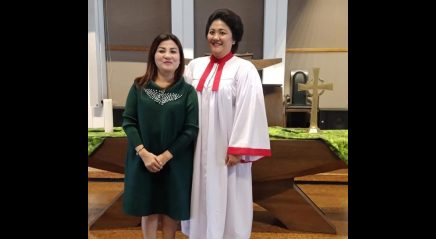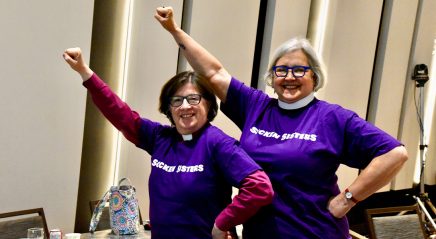In May, the ELCA marked Missing and Murdered Indigenous Women (MMIW) Awareness Month with a series of events focused on amplifying Indigenous voices and bringing critical attention to the ongoing missing persons crisis.
Events began with a May 1 call-to-action for all communities—congregations, synods, camps, universities, seminaries, social service agencies and the churchwide organization—to host a candlelight prayer vigil for MMIW. Congregations were also encouraged to take part in ELCA #MMIW Sunday and choose any Sunday in May to share the staggering facts surrounding missing Indigenous persons with those in their ministry.
ELCA congregants showed their support on the National Day of Awareness for Missing and Murdered Indigenous Women, observed annually on May 5, by wearing red and posting photos on social media to bring greater attention to the cause and showcase the number of people affected by this ongoing tragedy.
The Here I Pod podcast (elca.org/advocacy), hosted by Regina Q. Banks, released an episode featuring Vance Blackfox, director for Indigenous Ministries and Tribal Relations with the ELCA’s Ministries of Diverse Cultures and Communities team; Brenda Blackhawk, director of communications at Central Lutheran Church in Minneapolis; and me, Justice Nichols, program coordinator for Indigenous Ministries and Tribal Relations with the ELCA. The three ELCA leaders focused on the intersections of advocacy, climate justice, media representation and the ELCA’s ongoing Truth and Healing Movement for Episode 8: “MMIW Awareness & Indigenous Ministries of the ELCA.”
On May 13, Blackhawk and I, who serve as co-leads of the MMIW Sub-Task Force of the ELCA’s Repudiation of the Doctrine of Discovery Task Force, offered an instructional and empowering virtual presentation titled “Taking Action in the ELCA for MMIW.” Our presentation showcased ways in which various platforms can be utilized to spread awareness and engage everyday citizens to help keep the names and stories of the vulnerable in the news.
“A complex and confusing process”
On May 22, Blackfox led an especially emotionally charged webinar titled “A Conversation with Pamela and Emily.” During the webinar, hosted by the Truth and Healing Movement (produced by the Indigenous Ministries and Tribal Relations team), he spoke directly with Pamela Fencer and her daughter Emily Thompson about the disappearance of Fencer’s niece and Cherokee Nation citizen Aubrey “Shorty” Dameron from her home in Grove, Okla.
Fencer told webinar attendees how she felt on March 9, 2019—the day she learned from a friend that her niece was missing. She painstakingly recounted the many obstacles her family encountered in their search for Dameron, starting with mistakenly reporting the case to what they had believed to be the proper law enforcement office only to learn that their residence put them under a different county’s jurisdiction. Fencer said the last thing they needed in their heightened state of emergency was navigating an unfamiliar, bureaucratic chain of referrals.
“Regrettably, families of missing or murdered loved ones frequently encounter significant challenges related to jurisdictional authority,” Fencer said. “Determining which agency has the legal responsibility to investigate can be a complex and confusing process. This issue is especially pronounced in cases involving Tribal versus state jurisdiction, where overlapping authorities and differing legal frameworks can complicate and delay critical investigative efforts. As a result, affected families often experience additional emotional and procedural burdens while seeking justice and resolution.”
After filing her missing persons report with the proper authorities, Fencer said assigned officers would frequently profile Dameron and the family. Flippant allegations of drug use and casual mentions of the reported history of domestic incidents in the area they called home put Fencer and others in a defensive state she knew would never help their case.
For Fencer, one of the more upsetting aspects of collaborating with law enforcement officials had been their frequent misgendering of her transgender Two-Spirit niece despite efforts to set the record straight. Fencer and Thompson both felt as if their concerns about Dameron’s disappearance were never taken seriously by the authorities they were told to trust.
Tragically, Dameron’s remains were discovered in Cardin, Okla., on Jan. 31, 2025. Six long years after Fencer had reported her missing, her niece had been found just a 40-minute drive from her last known location.
The Quapaw Nation Marshal Service issued a media release on Feb. 5 that positively identified the remains and offered the family condolences. Fender and others took to social media at that time to thank those who had helped them in their search.
But Fender was quick to note during the webinar with Blackfox that the investigation into the cause and manner of Dameron’s death remains ongoing. The family now focuses on generating awareness and seeking justice—not just for Dameron but for all missing Indigenous persons—and welcomes everyone to join their cause.
Anyone with information about Dameron’s case is asked to call the Quapaw Nation Marshal Service at 918-238-3137 or central dispatch at 918-542-5585.
For additional resources, visit elca.org/mmiw.









